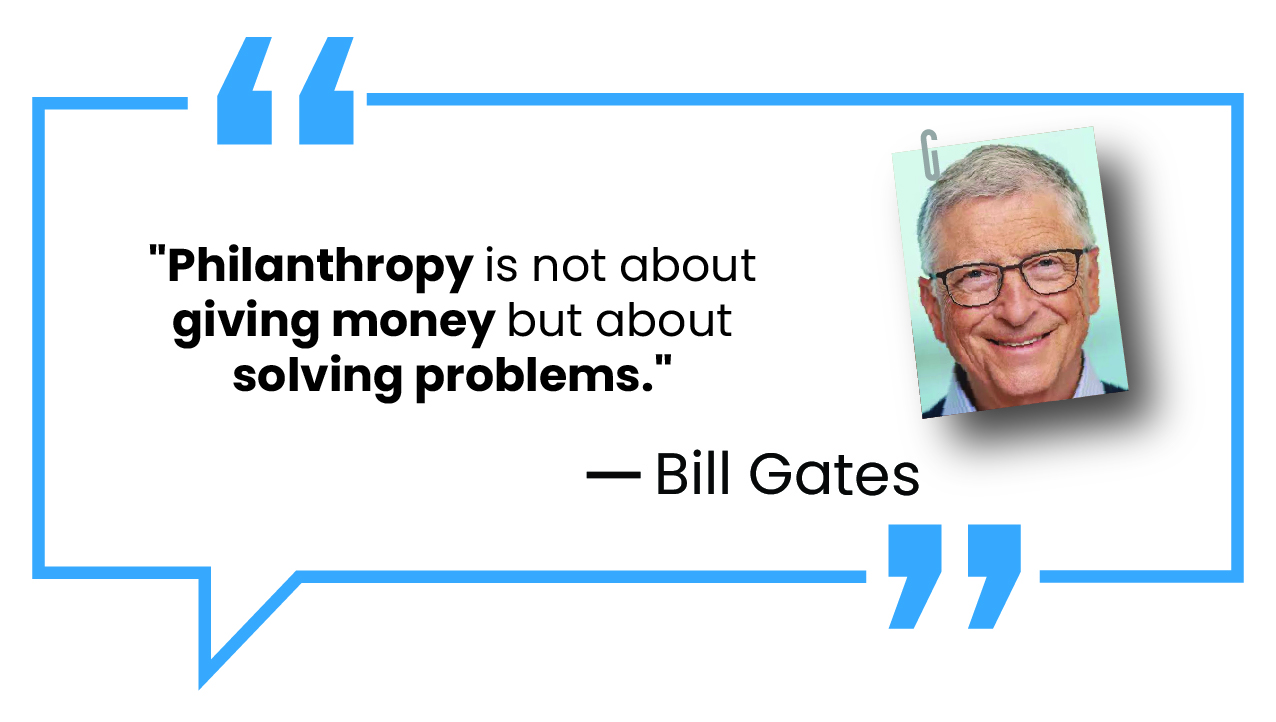Introduction
"Service to others is the rent you pay for your room here on earth." – Muhammad Ali. This sentiment is reflected in India's growing philanthropic landscape. According to the India Philanthropy Report 2025, philanthropic funding in India is rising primarily driven by corporate social responsibility (CSR) spending, contributions from ultra-high-net-worth individuals (UHNIs), and a rising culture of giving among the middle class. Philanthropy has been a part of many cultures from the ancient times to the modern era. Let's see what it really means in present context.
Philanthropy in modern context
The word philanthropy literally means 'love of mankind'. It embodies the benevolent practice of voluntarily donating financial resources to various type of institutions (such as educational, social welfare, scientific etc.) to promote wellbeing and happiness of one's fellow-men.
- Unlike charity, which provides immediate relief to individuals, philanthropy aims for large-scale, long-term and social impact changes which can uplift entire communities.
Philosophical Basis of Philanthropy
Indian Perspective
- Chanakya's Arthashastra: Donate 1/6th revenue for public welfare.
- Vivekananda's Daridra Narayana: Serving poor is worshipping God.
- Gandhiji's Trusteeship Theory: Wealthy must act as merely trustees of societal wealth.
- Religious:-
- Hinduism: Concepts of daana (giving) and dakshina (alms)
- Islam: zakaat (prescribed offerings ) & sadaqaat (voluntary offerings)
- Buddhism: bhiksha (alms)
- Sikhism: langar (community kitchens).
Western Perspective
- Consequentialist View (Virtue ethics): Generosity and compassion are important virtues.
- Kantian Ethics (Moral Obligation): It is our duty to be beneficient.
- Rawl's Theory (Justice as fairness): Prioritization of the most disadvantaged sections.
- Utilitarianism: maximize well-being for greatest number.
- Libertarianism: They emphasize moral superiority of philanthropy as compared to government-provided assistance.
Multifaceted aspects of Philanthropy
Philanthropic Ethics | Customary | Entrepreneurial | Spiritual/Effective Altruism |
Definition | It focuses on benevolence by showing adequate concern. | Well-conceived, sustainable social projects that create opportunities for upward social mobility. | Long-term initiatives aimed at addressing institutional voids. It is inspired by cultural values and religious principles. |
Objectives | Ameliorative | Transformational | Developmental |
Strategy | Opportunity Driven | Change Driven | Needs and Result Driven |
Project | Responsive | Proactive | Supportive |
Investment | Subjective | Objective | Mandatory and Discretionary |
Engagement | Limited Engagement | Extensive Engagement | Holistic Engagement |
Major Areas of Focus | Community cohesion, charity initiatives | Individualistic approach, Equal access to opportunities | Responsive Capitalism, Legacy, developmental goals |

Significance of philanthropy as a development tool
- Bridging Funding Gaps: Supplement critical budgetary support given by governments.
- Addressing Development Gaps: Such as poverty alleviation, education, and healthcare access.
- E.g. Azim Premji Foundation enhances rural public education.
- Catalyzing Innovation: Tech-driven initiatives like digital literacy programs/healthcare startups.
- E.g. Bill & Melinda Gates Foundation focus on sanitation innovations aligning with Swachh Bharat Mission.

Ethical challenges in Philanthropy
- Elite capture of social agenda: Experts argue that large donors may influence policy decisions thereby amplifying voices of the wealthy. Moreover, it is often used for tax evasion & money laundering activities.
- Corporate Dilemma: Responsibility of businesses is to increase profits and philanthropy goes against shareholder's assets.
- Welfare Replacement: It may reduce government's accountability for welfare spending thereby shifting public responsibility to private actors.
- Regional and Geographical Inequality: Urban-centric donations (Maharashtra & Karnataka get maximum CSR funds, whereas Bihar & Odisha lag far behind)
- Cultural & Religious Biases: Donors may favour causes which are in sync with personal beliefs.
- Accountability and Transparency Deficits: Miniscule amount of NGOs which receives foreign funding's file returns. There have been also restrictions on NGOs giving rise to debate of balancing sovereignty concerns versus development needs.
Conclusion
Philanthropy should have foundations laid on ethical considerations of promoting an egalitarian society characterised by equity and justice. . Philanthropy's potential to reach to the bottom rung of the society, where hundreds of millions of our citizens live, where neither the state nor the markets can reach, should be rightly utilized to reach that very last citizen.
The next generation of generosity must shift from Corporate Social Responsibility donations to conviction-led investment, broad-based participation enabling democratized giving beyond elite circles and must be used as a tool to complement justice and bringing in systemic reforms rather than merely a temporary relief leading to effective altruism.

Case StudyA wealthy industrialist, Mr. X, donates ₹50 crore to build schools in rural areas, gaining public praise. Later, it's revealed he evaded taxes worth ₹30 crore and used the donation to improve his company's image while claiming tax benefits. Critics argue his philanthropy is a tool for personal gain, while supporters say the schools still benefit society.
|




